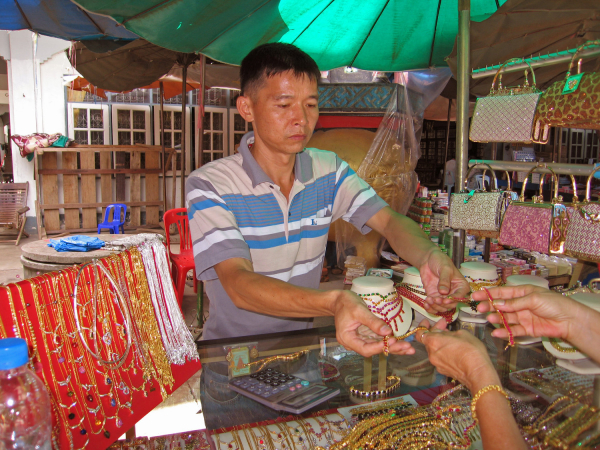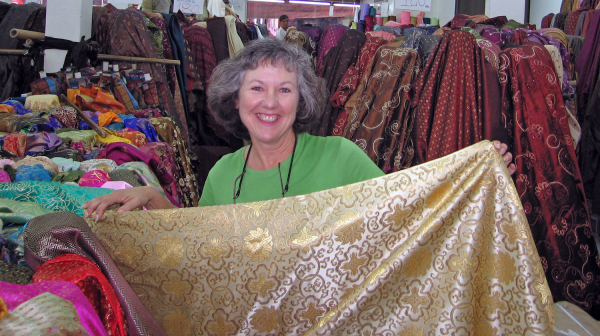
By Akaisha Kaderli, Guest Contributor
I’m a world traveler, and I’m here to help.
Grown adults from the U.S. and Canada can find themselves shaking in their boots, confused, frustrated or even angry when it comes to bargaining for goods in foreign countries. It’s safe to say that many Americans find it distasteful, yet bargaining is inherent in cultures around the world. Native peoples have developed this communication skill for centuries, exchanging live chickens for bags of rice, avocados or woven cloth.
Taught how to sell by their parents or an older sibling, it is a common event to see children out on the streets or in vendor stalls in Mexico, Guatemala, Thailand, Vietnam, Myanmar, China and dozens of other countries all around the globe.
So why do lots of tourists shy away from wrangling over the price of their souvenirs? Or Expats find themselves overpaying for goods and services in their newfound retirement paradise? Besides the fact that there is a large gulf between cultures on this subject, it is my opinion that Americans and Canadians do not understand the value of the choreography between buyer and seller.
Let’s Dance
One thing that countries in Asia, Mexico and Central America share in common that North America has very little of, is the expectation to bargain for the price of goods and services. Bargaining, a dance between buyer and seller, is integral in these cultures. It is through this negotiation on the terms of exchange that both participants learn a great deal about the other person.
Is the party on the other end of the deal a fool? Do they know value when they see it? Are they informed about their product? Are they arrogant and abusive? Can they be pushed around? Are they decisive? What about having a sense of humor, or a balanced sense of generosity? Do they show respect and honesty?
This exchange of information goes on underneath the dickering over price, and most North Americans find it unsavory. “I want a price, and I want it marked. Fair and the same for everyone” they say, as a way to explain their sense of equal justice. People from this culture prefer an obvious price before making up their mind whether to purchase it then or wait until the item goes on sale. There is no messy emotional entanglement in this exchange; in fact, there is no “relationship” involved at all. It is the decision of a single person: “here it is, at this price, do I want it or not?”
However, personal interaction is an essential ingredient in bargaining cultures, and by eliminating this unspoken, under-the-surface dialogue, there would no longer be the dance. You would be ripping out of them an inbuilt part of their civilization that allows them to peer inside of your person. It’s an accepted form of communication for them. The thing is, most tourists and Expats don’t know that.
But I’m no good at this…
Dickering over price can trigger anxieties in those who feel incompetent in this skill. Nothing can be more aggravating than thinking you are being taken advantage of, akin to dealing with a smarmy used car salesperson. If you do not know local pricing or know little about the product you want to purchase, then you could be overpaying. Lack of trust or a sense of lack of control could plague you. But wait! There’s hope.
Bargaining How-Tos

You’re not in Kansas anymore. The best way to meet the challenge of bargaining is to know the local pricing of something. Just because the cost of a similar necklace, weaving, bedspread or house rental in New York City, Toronto or San Francisco is “X,” you will be going into this situation at a distinct disadvantage if you think the first price offered to you is the best deal you have ever heard. That amount in Dallas would be a steal – the thing is, you are not IN Dallas. You are dealing with a completely different financial economy and pricing structure.
The asking price is always high and reflects an out-of-the-ballpark amount that the seller dreams to receive. To begin the bargaining process, offer him one-third of this beginning figure. To the uninitiated, that paltry amount might seem insulting. And if you compare that price to the prices in Miami, it would be. But the truth is, experienced buyers and sellers, realize that the counteroffer is equally ridiculous. The real price lies somewhere in the middle. The dance has begun.
Why haggling is essential when traveling
Those who refuse to bargain while living or visiting in these cultures – completely unaware of what the neighborhood pricing is – place themselves and other tourists at a financial disadvantage. Because they are willing to pay 3, 5, even ten times or more than anyone in the vicinity would ever pay, vendors who make their living by selling begin to automatically assume that all tourists are rich; money is due to them and is simply there to be grabbed. It is easy to think “well, it’s just a few bucks and they really need it more than I do,” but that attitude will put you in a weak purchasing position and botches the balance between you.
Get ready to haggle!
Prepare yourself by checking around locally to find the cost for similar items, so you know what you are talking about. This will give you the confidence and sense of fairness you need to stand firm on the price you want to pay. Remember, the more items you buy, the better price you should get. Quantity equals a bigger discount.
Once, while living in Thailand, I commissioned my seamstress to make half-a-dozen reversible Chinese silk robes. On the initial deal, I gave her a drawing and discussed price for one robe. After we agreed on the timeline and the amount, I told her I would like five more robes made, just like this one. Could I get a discount for ordering a total of six? Smiling, she realized that she had several weeks’ worth of work being offered to her and would be bringing in a larger amount of money to her home, and she gladly marked my price down even further. We both received what we wanted. Guaranteed work mattered to her and price mattered to me.

Bargain for living quarters
Living in a foreign country on a long-term stay or as your retirement destination opens up the ability to also bargain for your rental amount. Renting a hotel room, an apartment or a home from a local can present the opportunity for better pricing if you like to negotiate. Offer to stay for a longer period, pay the rent a couple of months in advance (get a receipt), or offer to make small repairs yourself. This shows the landlord that you are making a good faith deal and he will likely offer you a better price. Not only are you helping yourself with this transaction, but you are also keeping costs in your area down for others who may choose to live there. It’s a win-win for everyone. He gets guaranteed income for a certain length of time, and you get a more affordable rent.
Be willing to leave the deal
To perform a negotiation well, you have to be willing to walk away. Vendors have been selling their wares since they have been 6 or 7 years old. They have learned to read both facial expressions and body language, and many of them are persistent. You might think that you are dealing with a young girl or boy, but they are seasoned and skilled at what they do. They know the value of their goods and can read you and your wallet well.
You might want something terribly, but you have to be willing to leave the deal. If the vendor calls you back, then the price you offered is considered fair – or at least workable. Vendors will not sell at a loss, so if he or she holds firm even after you have left, then you have found his bottom price. Treat it as valuable information. You can always go back tomorrow and open the business deal again.
Don’t engage unless you are serious
This isn’t a game. Vendors value their time too, and do not take kindly to your wasting it. Do not seriously engage the bargaining process until you are ready to purchase. If you are on your fact-finding mission of finding local pricing, indicate such to them. Say things like “I am just looking today, thank you” or “I’m curious, for example, what would this cost, if I wanted to buy it?” This lets them know that today is not your purchasing day and they will not rev themselves up for deal making. They will respect you for your honesty and will save their energy for another customer.
If you begin the financial dialogue but are not sincere, you have treated him without courtesy, and have sullied that relationship. You can fully expect to be verbally reprimanded or rebuffed.
Keeping the Financial Ecology Balanced
Indigenous people honor and value the skill of bargaining, and they know what something is worth. Even if they make faces or have drama with their hands up in the air, it’s all part of the play. If money is thrown at them due to what we might perceive as compassion, the native finds himself in the curious position of wanting and needing the money you have and disliking you for tossing it around so carelessly. He also dislikes himself for having taken your money without the expected bargaining process, and a disrespectful and distasteful posture often develops between the two cultures.
He takes pride in earning the price he receives. How can an Indigenous person respect someone who does not know proper value when they see it and simply casts money away like that?
Billy and I call this exchange between vendor and purchaser, financial ecology. It has been our experience that if this interchange becomes unbalanced, emotional attitudes on both sides sour. That is why so many tourist destinations become rip-off locations because the authenticity between the two parties has been lost.
Few North Americans understand this tradition and sequence of events. Even if you feel that you are a horrible haggler, you must make an effort, or there will be no respect given to you. You will have placed a neon sign on you saying you are an easy target, and unscrupulous vendors begin to congregate into the area because the word has gotten out that it’s a “gravy train” at that location.
So the next time you find yourself in a bargaining situation, take heart! Have fun! Implement the suggestions I have made above, arm yourself with knowledge of local pricing, and go shopping!
About the Authors
Billy and Akaisha Kaderli are recognized retirement experts and internationally published authors on topics of finance, medical tourism, and world travel. With the wealth of information they share on their award winning website RetireEarlyLifestyle.com, they have been helping people achieve their own retirement dreams since 1991. They wrote the popular books, The Adventurer’s Guide to Early Retirement and Your Retirement Dream IS Possible available on their website bookstore or on Amazon.com.
I haggle all the time. Abroad, flea markets in and around our beautiful city and others. Even at my dentist, on my out of pocket cost on cosmetic applications. Who says you have to go by set prices?
Interesting! Even a dentist office! I walked into a store when I saw a winter coat in the window. I asked the price. Way too much, in my opinion. I was ready to leave when the salesman gave me 50% off!! I bought the coat and I adore it. How lucky was that! Warmly, Honey
If I’m in a wealthy country, then yes, I’d haggle. But I just cannot see haggling over the price of something that is already so affordable that the $3 I would save is no big deal to me, but maybe huge to the vendor. For example, my husband flies to Quito Ecuador a lot, and he refused to haggle over the price of those beautiful blankets, which are about $15. These people are poor, we are rich, and that’s the end of it for us. If I lived there, then yes, I’d find out what other people pay for goods and services. But over trinkets and souvenirs, no.
I agree with you 100%. A contributor wrote the article. She is a world traveler and a great gal. Warmly, Honey